Studio Meraki’s Annual Student Recital

Whenever I think of student piano recitals, I remember the image of the performance being the tip of the iceberg and not many people seeing the larger portion of the preparation underneath the visible part. Not many people in the audience would know how the teacher went through several books to find a recital piece which would suit each child’s technical capability and temperament and at the same time form a balanced and entertaining programme; the countless lessons and rehearsals; how the students spent hours toiling away alone at their piano trying to get every detail of dynamic, articulation and phrasing; how parents rearranged their schedules to drop off their children for extra rehearsals; all the logistics of printing programmes, certificates, snack distribution, preparing a slide show and hall seating arrangements. The hope is, that at the end of these weeks and months of preparation, we have managed to put up a show where our audience is entertained and educated.
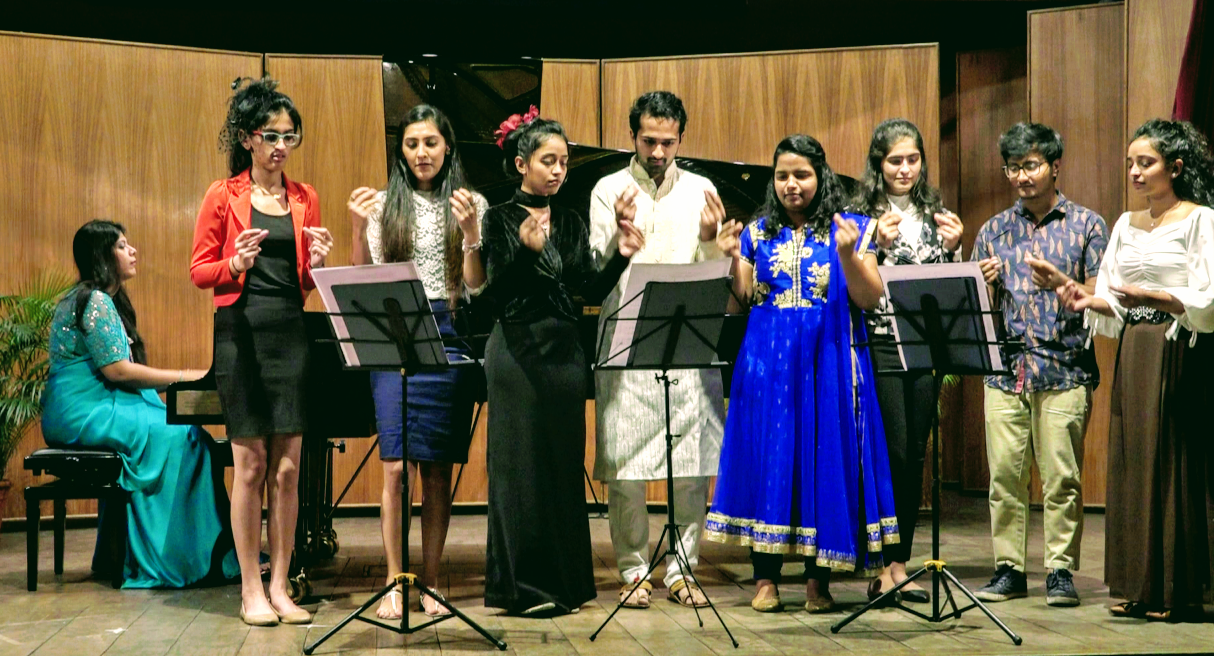
On the 8th and 9th of February, 2020, 43 performers of Studio Meraki along with 2 special guests performed at Mazda Hall, Pune in their annual recital “Around the World” presenting works describing or written by composers from over 40 different countries. The students were asked to dress according to the country they were representing and most of them enthusiastically put in the effort to dress their part. A slideshow ran alongside giving pictorial information about the piece, the flag of the country and name of the performer. The Studio has been known to present entertaining and informative recitals with high performance standards and this year as well we got a full house on both days with a total audience count of over 500 guests. Our audience comprised not just of the families of students and well wishers but also music connoisseurs, amateur music lovers, music teachers from Pune and those for whom this was their first exposure to classical music.
This is the first time we decided to base our recital on a theme. The aim was to take the audience on a musical journey around the globe to convey the message that despite our differences, music is the universal language which can help us learn about each other and celebrate our diversity. After much research, some of the countries we managed to represent were UK, USA, Australia, Ireland, Russia, Switzerland, Brazil, Jamaica, Tanzania, Uruguay, Italy, Hungary, Spain, Cuba, Argentina, Czechoslovakia, Syria, Israel, Poland and Finland among others.
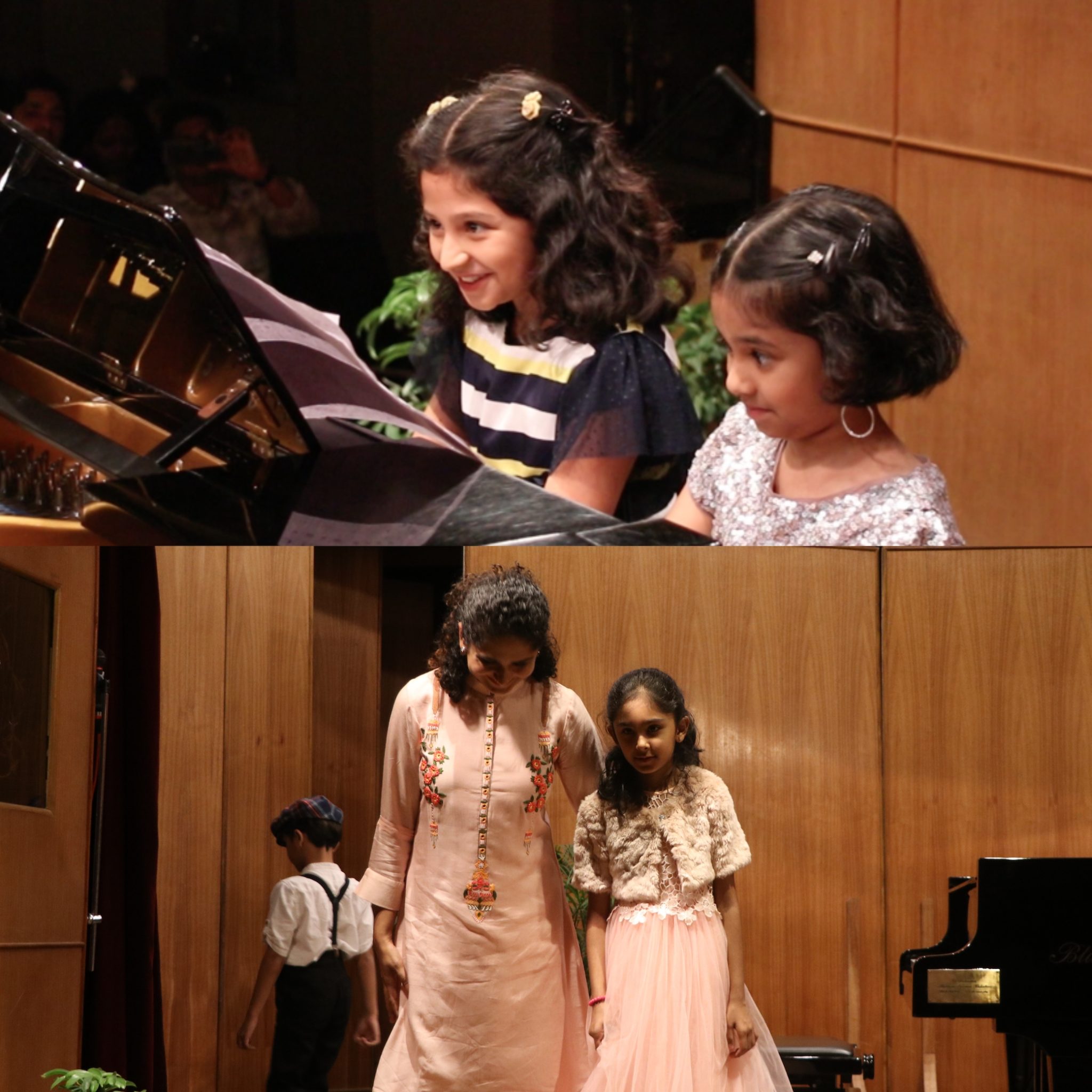
On both days the show commenced in a unique way, with Andrea Dow’s composition of percussion -based body beats and piano accompaniment performed by 6-10 senior students with me at the piano. Our host Dhruv Shah and Karan Shetty, kept the audience entertained and informed about the pieces being performed along with behind the scene anecdotes.
The students were divided into groups and each group began with a junior student who performed along with their teacher. We had around 9 children under the age of 10 with our youngest just 5 years old. For most of these children, it was their first time on stage, in front of such a big audience and they were excited and intimidated looking at the magnificent Blüthner concert grand piano. It was a heart warming sight to see our future musicians walk on to stage confidently in costume to the encouraging applause by the audience. For the first time we had two siblings playing a duet with each other in their stage debut: 8-year-old Kimaya and 6-year-old Rianna Shah played an arrangement of Brahms’ famous Hungarian dance.
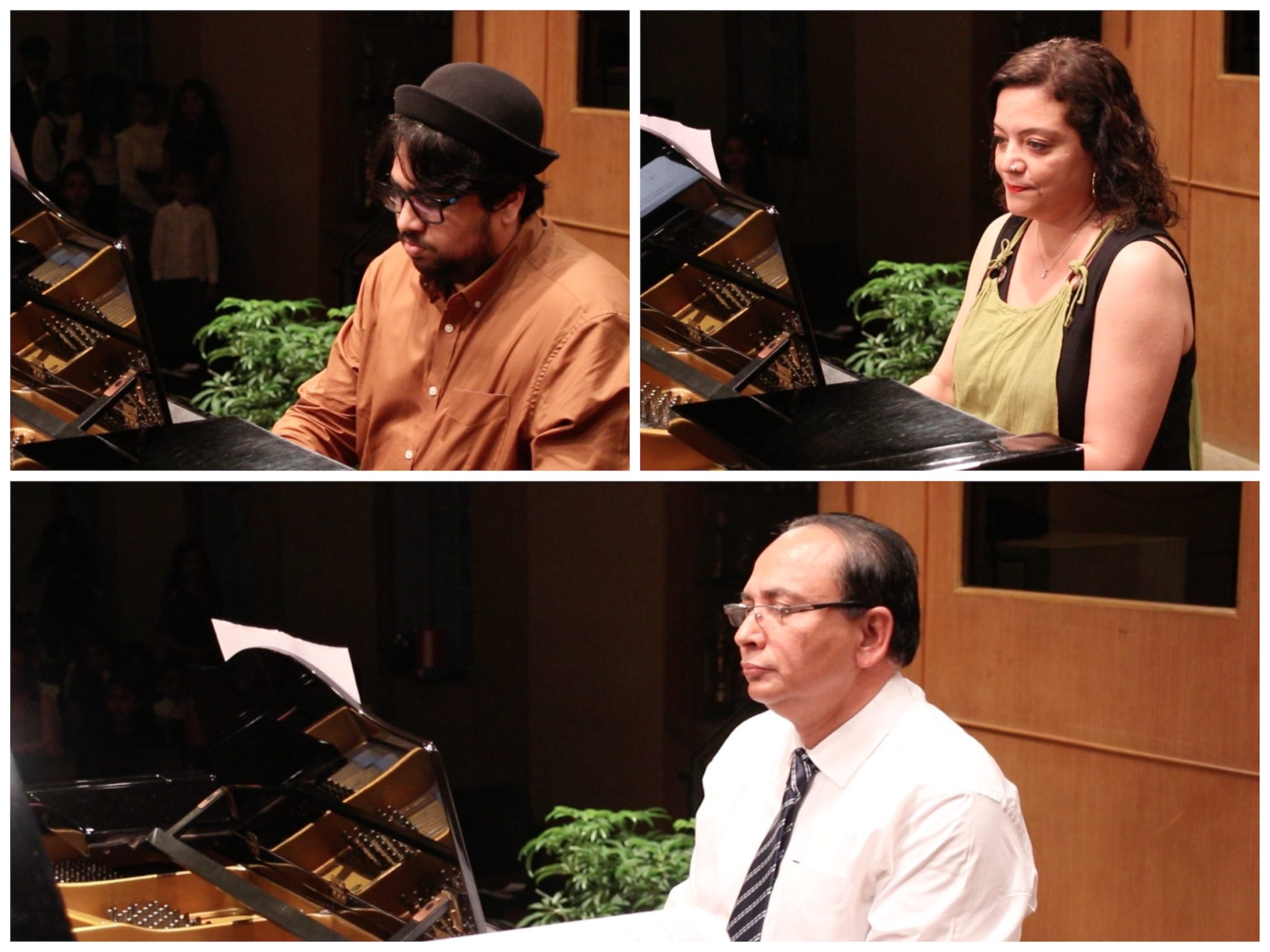
It was also the stage debut of 58-year-old Mr. John Abraham who started learning with us a couple of months ago and is an inspiring example that it’s never too late to learn! Our adult students Rashnae Boyce, lawyer by profession, and Priyabrata Panigrahi, who was the film composer for the much acclaimed film “The Last Colour”, were perhaps more nervous than than our juniors, but got the audience tapping their feet to their dance tunes from Ireland and the UK respectively. For the first time we also had a mother-daughter duo of Pragya and Avni Anand, playing a Dutch Dance.
It was very interesting for the audience to see the different effects created on the piano by composers. Zara’s Iceland piece At Play in the Wind in the higher registers of the piano used irregular time signatures to depict the Northern Lights; Sameer’s Buccaneer composed by Malcolm Arnold used strong bass, loud dynamic and strict rhythm to give the image of a pompous pirate moving forward through menacing waters; Nikita played Grieg’s Butterfly from his Lyric Pieces which used chromaticism and tempo changes with the una corda to depict the flight of a delicate butterfly through the Norwegian landscape; The Song of Twilight performed by Veda set a calm mood and used the pentatonic scale to transport us to Japan under the Sakura.
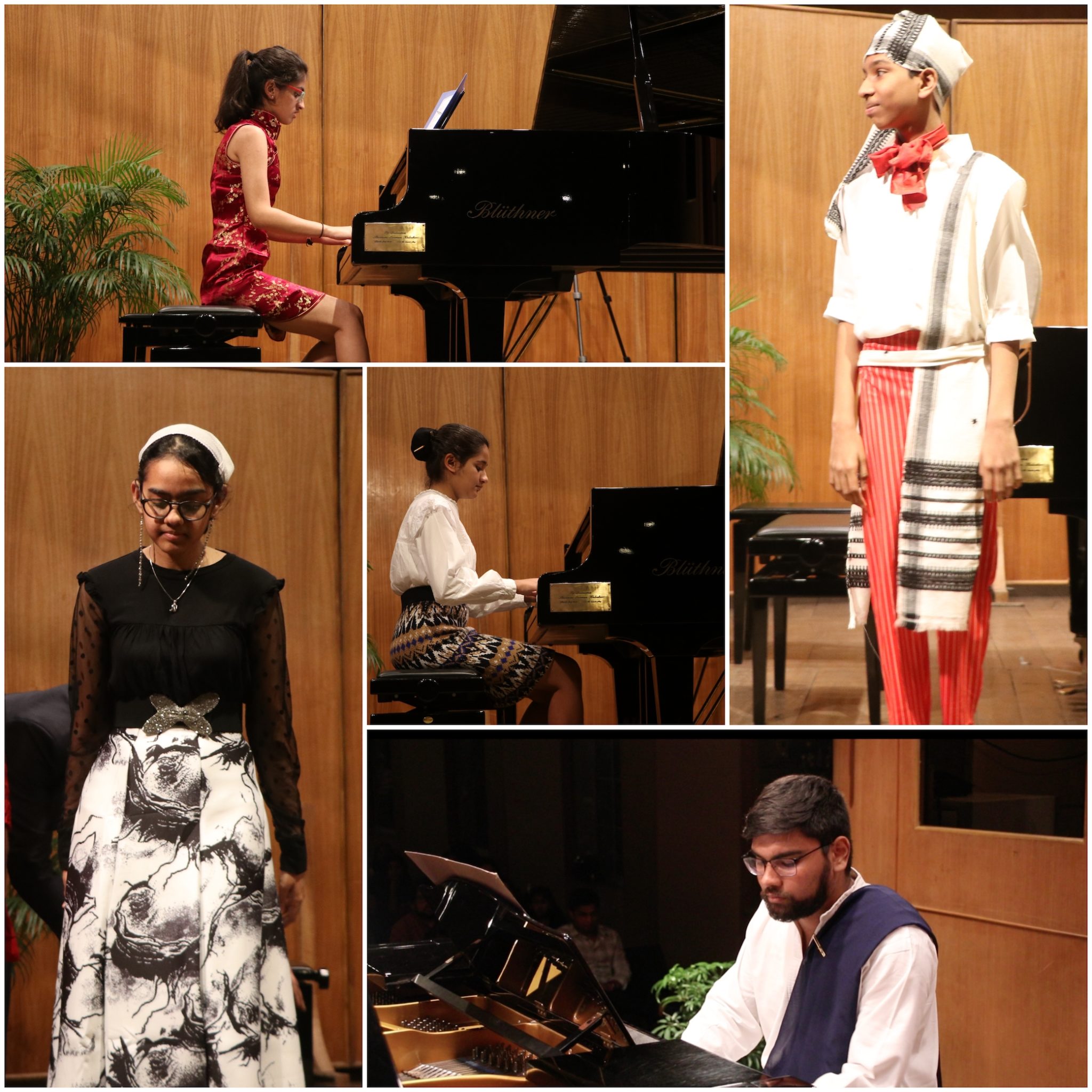
While arranging the programme, we make sure to include some familiar music interspersed with classical pieces. The audience got their feet tapping with the Ritchie Valens’ Mexican hit song La Bamba performed by Roxane. Everyone at the hall had a smile of recognition on listening to Alina playing the famous Ballade Pour Adeline which made Richard Clayderman shoot to fame. South Korean pianist Yiruma’s River Flows in You and October’s Time to Love performed by Aarmita and Nishant respectively was a familiar love ballade, enjoyed by the audience. Mukta and Nandita performed Under the Sea from Disney’s Little Mermaid and Arnav played the imperial Star Wars Theme which got most kids excited and the adults reminiscing.
Many in the audience thought our pieces for India would be Bollywood songs but were pleasantly surprised by Vineet Panikkar and Nakul Jogdeo’s compositions performed by Ajey and Ankitha respectively. It made people aware that there were contemporary composers using modes and rhythm of Indian character in the western style of composition.
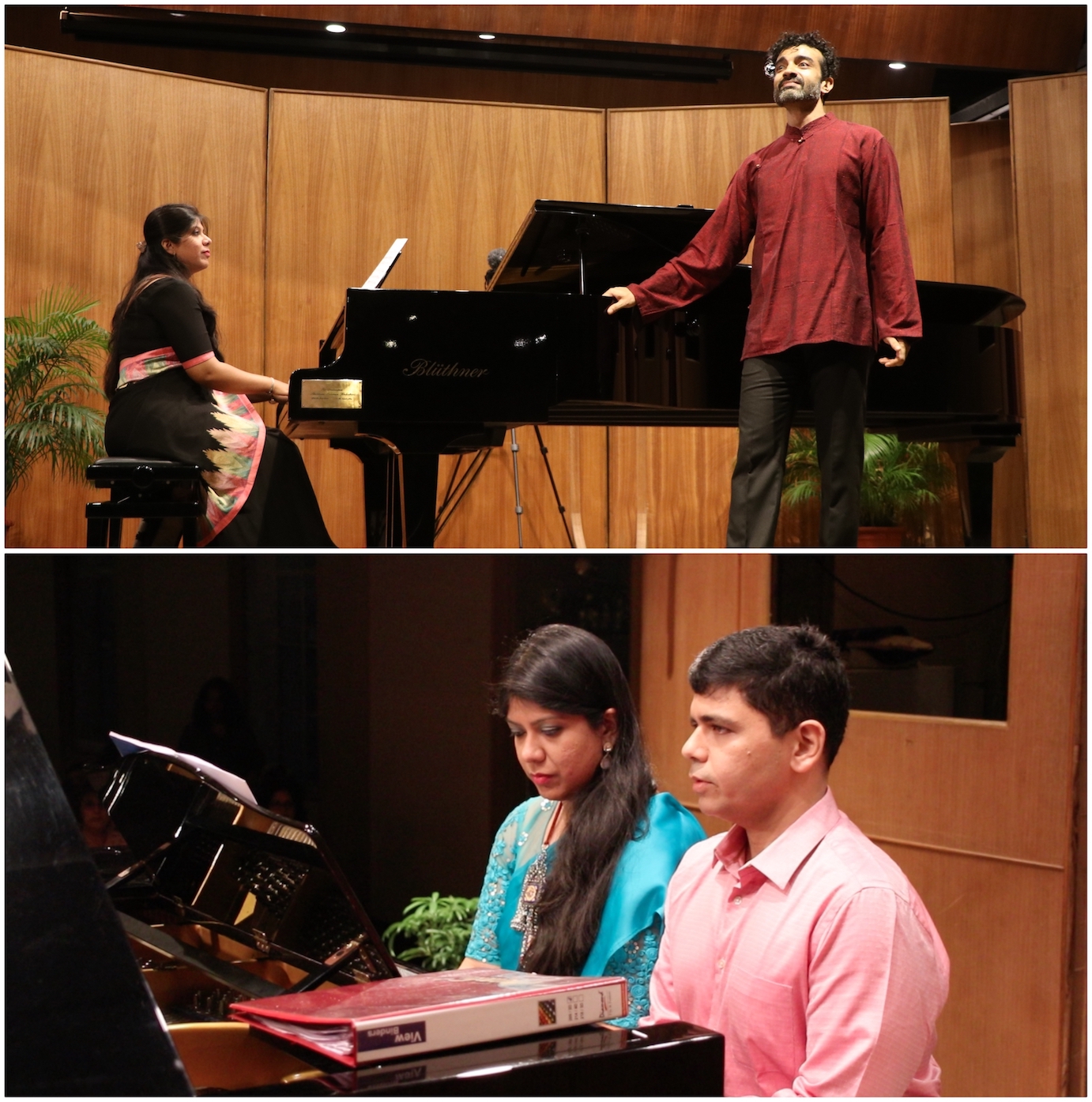
To end the first day, our special guest, the baritone Rahul Bhardwaj, performed a set of songs by American composer Amy Beach including her famous The Year’s at the Spring and the Lotos Isles written by Lord Alfred Tennyson. The audience was enthralled by Rahul’s singing and on popular demand, we invited Rahul to perform the second day as well. In addition to the Beach, Rahul performed the mysterious Smuggler’s song written by Rudyard Kipling and the philosophical Myself When Young written by the Persian mathematician and poet Omar Khayyam. Accompaniment is an important skill that must be developed by a pianist and it was a good experience for the students to watch how to collaborate and enhance the music as a team.
Dr. Sacheen, a renowned homeopathic doctor was our special guest on the second day. Sacheen & I have performed as a duo very often and were also awarded the Exhibition Award for highest marks in the country in the Advanced Certificate Exam. We performed the Dvorak’s Slavonic Dance Op. 72 No. 2 and a 4-hands arrangement of the popular K-pop (Korean pop) song, Sunrise.
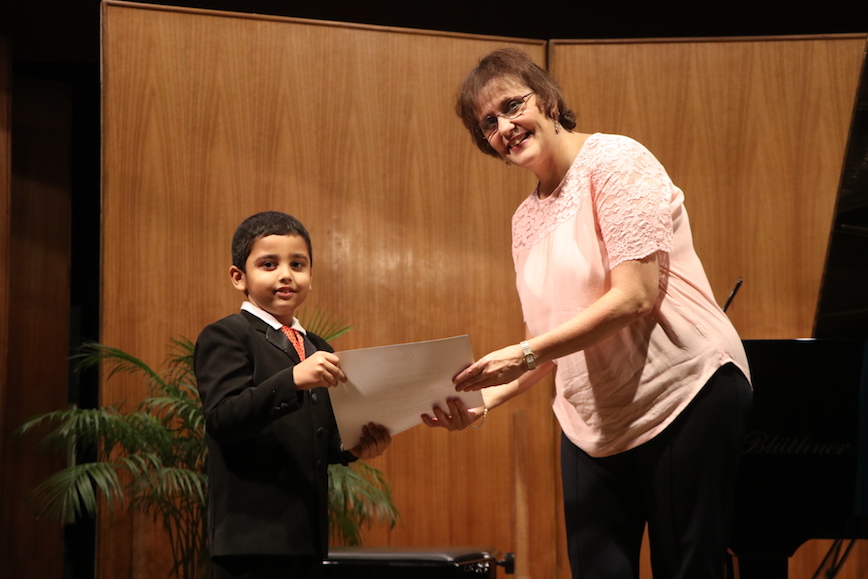
As opposed to 4 hands where the performers work as a team, we had a Duet battle between Roxane and Akshit, where each performer was trying to outshine the other. Mixed in with a short acting skit, it was very popular with the audience watching them pull each other’s leg and try to sabotage the other’s performance.
It was a moment of pride when all the students were awarded certificates, distributed by my teacher Ferieda Havewala. At all our recitals, we try and provide each student the opportunity to perform on stage and share their music with the world. Some of the students may not be upto the “high standards” of playing or may not be performing “difficult repertoire” but I think each child learns a lot on this journey of preparation for a recital. Over the years I have seen each child getting more confident, overcoming their own personal challenges, working harder than they ever thought possible and expressing themselves on stage which requires a lot of courage. Of course there were mistakes, false starts, memory lapses, but we must never lose sight of the fact that we are blessed to be creating music and the world is a better place with more music, art and culture.
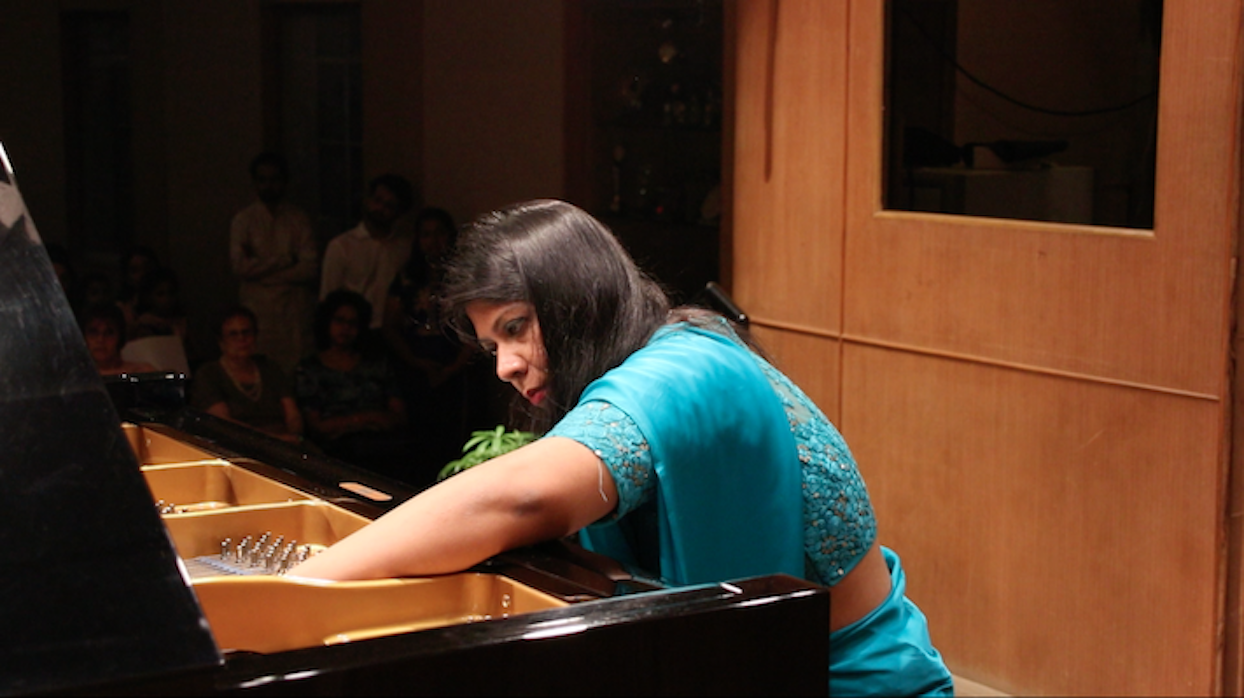
The last solo act of the final day was my performance of Black Earth composed by Fazil Say based on a Turkish song, Kara Toprak, composed by the balladeer Aşık Veysel. The highlight of this beautiful work of longing and loss was the muted effect created to imitate the sound of the Turkish lute, Saz. It was the first time many in the audience had heard this effect from the piano and it left most people astounded. I got many queries later on how I achieved the sound and about the different effects that can be created from the inside of the piano.
A fitting ending to this 2-day journey around the world was one final medley of popular songs from around the world which had the audience singing along as well. We began with Mamma Mia by the Swedish group ABBA and moved on to Hey Jude by the British band, the Beatles. We returned back home to India with the Oscar winning Jai ho by A R Rahman. Our next stop was to South Korea with first YouTube video to hit a billion views – Psy’s Gangam Style. We ended with We are the World written by Michael Jackson and Lionel Richie which best conveyed our message that the power to make the world a more harmonious place to live in, rests with all of us.





